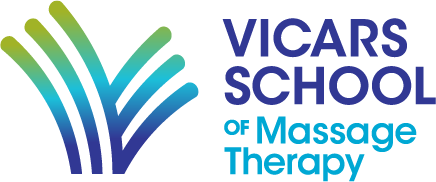Massage Therapy Certification
At Vicars School of Massage Therapy, you will get a massage therapy education that meets the highest national standards—on a schedule that fits your life. Our 2200-hour massage therapist diploma program is fully accredited by the Canadian Massage Therapy Council for Accreditation and will prepare you for a successful career in this growing field.
How do I earn massage therapy certification?
Massage therapy is a valuable and important health-care profession. Effective massage therapists significantly improve the lives of their clients by reducing stress, alleviating pain, and effectively treating a wide range of injuries and physical conditions.
Health-care professions communicate to patients and clients that they have extensive training by awarding a form of certification. In massage therapy, such certification is called registration.
This status requires a successful completion of a diploma program. To become a certified, registered massage therapist (RMT), you must successfully complete a comprehensive 2200-hour program offered by a recognized massage therapy school. A massage therapy diploma program is a balanced combination of hands-on training and academic coursework. Look for a program that includes in-depth coursework in:
- Anatomy and physiology
- Pathology
- Kinesiology and therapeutic exercise
- Massage techniques
- Assessment and treatment planning
- Ethics and communications
- Business and marketing
Once you have graduated with your massage therapy diploma, it’s time to become registered. You do this by applying to either a professional association or regulatory college (depending on where you live). If your skills and knowledge—in other words, your education—meets their standards, they will accept you as a member. Congratulations! You’re now a registered massage therapist!
Depending on where you live, you may need additional certification or licenses to practice massage. For example, the business licensing rules for massage therapy clinics varies city by city.
What kind of massage therapy diploma program should I take?
A great career begins with a great education. Choosing a massage school is one of the most important career decisions that you will make.
You need to choose a school that meets the highest Canadian massage therapy education standards, will prepare you for the specific requirements of your own province, and will offer a learning experience that suits your learning needs.
The first two criteria are the easiest to verify. Your school should have either full or preliminary accreditation status from the Canadian Massage Therapy Council for Accreditation. This accreditation ensures that the school adheres to the standard set for schools in regulated provinces. The CMTCA standards exceed the current standards in non-regulated provinces like Alberta.
Figuring out if a school suits your individual needs as a student is more subjective, but it’s still important. Evaluate practical aspects such as class schedules and facilities and take advantage of opportunities to check out the campus. Book a massage at the student clinic to get a firsthand feel for the school’s approach, take a tour, or attend an online or in-person information session with staff.
This will help you get a feel for whether the school aligns with your goals and your career aspirations. Beyond this, trust your own instincts to guide you. Does the school resonate with you on a personal level? As you tour the facilities and learn about the program, can you see yourself succeeding as a student and a graduate of that school?
Get in Touch
Our friendly and knowledgeable admissions advisors will help you decide for yourself if Vicars school is a good fit for you.

